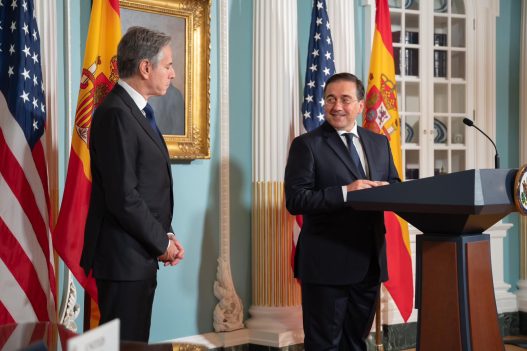
SPAIN AND THE UNITED STATES REACH AGREEMENT TO COMBAT DISINFORMATION
By Jesús González, Special Correspondent / Aquí Europa and The Diplomat in Spain
The Spanish Minister of Foreign Affairs, José Manuel Albares, and the U.S. Secretary of State, Antony J. Blinken, have signed this May 10, 2024 a bilateral agreement to combat disinformation, after the meeting that both have held today in Washington.
In the signed memorandum, special mention is made of Spanish, but other languages are not excluded, diplomatic sources told The Diplomat. There are currently 324 Spanish-language media outlets in the United States.
The content of the memorandum, explained by the same sources, has five fundamental points:
1.- Spain and the United States decide to jointly address information manipulation exercised through methods such as propaganda or disinformation, which can create or foster within countries and compromise the integrity of elections.
2.- They point out that internal interference is a threat to national security.
3.- A work plan on disinformation is established in Spanish, but other languages are not excluded.
4.- The participants in the agreement will support the institutions that cooperate in this matter.
5.- In the bilateral sphere created to counteract manipulation, both States will exchange information always within the framework of the laws and regulations of each of the two countries.
EUROPEAN PRESS LAW
This agreement comes just a week after the approval of the European Union’s Press Freedom Law, which must be transposed by Spain. It establishes a new set of rules to protect the pluralism and independence of the media in the EU. They will ensure that the media (public and private) can operate more easily across borders in the EU internal market, without undue pressure and taking into account the digital transformation of the media space.
Authorities will be prohibited from pressuring journalists and editors to disclose their sources: they will not be able to detain them, sanction them, search their offices or install intrusive surveillance software on their electronic devices. Important safeguards have been added to allow the use of spyware. This will only be possible for specific cases and with prior judicial authorization to investigate serious crimes punishable by imprisonment. Journalists will have to be informed that they have been subject to surveillance and will be able to object in court.
A mechanism has also been included to prevent very large online platforms, such as Facebook, X (formerly Twitter) or Instagram, from arbitrarily restricting or removing independent media content. Platforms will first have to distinguish independent media from non-independent sources. Media outlets will receive a notification when the platform intends to remove or restrict their content and will have twenty-four hours to respond. Only after receiving a response (or in the absence of a response) will the platform be able to remove or restrict content if it still does not comply with its conditions.
————
This article was originally published in Aquí Europa and The Diplomat in Spain, with whose permission we reproduce it.



